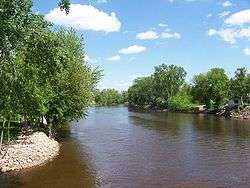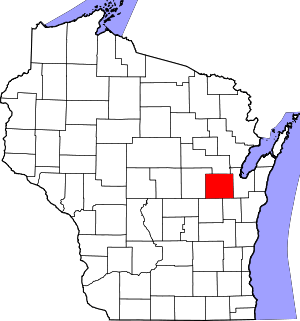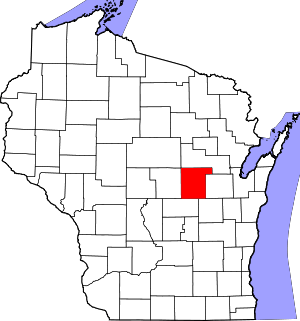New London, Wisconsin
New London is a city in Outagamie and Waupaca Counties in the U.S. state of Wisconsin. Founded in 1851,[6] the population was 7,295 at the 2010 census. Of this, 5,685 were in Waupaca County, and 1,640 were in Outagamie County. The city has a Saint Patrick's Day Parade, Irish Fest, and week-long festivities, when the city's name is changed to "New Dublin" for the week.[7]
New London, Wisconsin | |
|---|---|
 Old City Hall of New London | |
| Nickname(s): New Dublin | |
 Location of New London in Waupaca &Outagamie Counties, Wisconsin. | |
| Coordinates: 44°23′14″N 88°44′25″W | |
| Country | |
| State | |
| Counties | Waupaca, Outagamie |
| Area | |
| • Total | 5.77 sq mi (14.95 km2) |
| • Land | 5.55 sq mi (14.36 km2) |
| • Water | 0.23 sq mi (0.58 km2) |
| Elevation | 768 ft (234 m) |
| Population | |
| • Total | 7,295 |
| • Estimate (2018)[4] | 7,137 |
| • Density | 1,286.87/sq mi (496.90/km2) |
| Time zone | UTC-6 (Central (CST)) |
| • Summer (DST) | UTC-5 (CDT) |
| Area code(s) | 920 |
| FIPS code | 55-56925[5] |
| GNIS feature ID | 1570226[2] |
| Website | www.newlondonwi.org |
The American Water Spaniel was developed as a registered breed by F. J. Pfeifer of New London.[8] It was named the state dog in 1986.
History
For thousands of years, this area was occupied by successive indigenous cultures. Some were known as moundbuilders, constructing a reported 72 earthworks near what is now Taylor Lake in the county, including many effigy mounds. Their descendants included the Menominee, who lived here for thousands of years. In the Menominee language this place is known as Sakēmāēwataenoh, meaning "mosquito place", likely due to its riverside location.[9] The Menominee sold this land to the United States in the 1836 Treaty of the Cedars, which saw over four million acres of land in Wisconsin sold after years of negotiation about how to accommodate the Oneida, Stockbridge-Munsee, and Brothertown peoples who were being removed from New York to Wisconsin.[10]
Following the treaty which made the land available for purchase, New London was established by European-American settlers in 1852 and was named after New London, Connecticut by Reeder Smith, a founder whose father was from there. Reeder Smith built the plank road between Appleton and Stevens Point.[11] New London became a lumber center and the terminus of steamboats plying the Wolf River from Oshkosh.[12]
Geography
New London is located at 44°23′14″N 88°44′25″W (44.387142, -88.740140).[13] According to the United States Census Bureau, the city has a total area of 5.78 square miles (14.97 km2), of which, 5.55 square miles (14.37 km2) is land and 0.23 square miles (0.60 km2) is water.[14] New London sits on both the Wolf and Embarrass Rivers, making it a destination for boaters and fishermen.
Demographics
| Historical population | |||
|---|---|---|---|
| Census | Pop. | %± | |
| 1860 | 468 | — | |
| 1870 | 1,015 | 116.9% | |
| 1880 | 1,808 | 78.1% | |
| 1890 | 2,050 | 13.4% | |
| 1900 | 2,742 | 33.8% | |
| 1910 | 3,383 | 23.4% | |
| 1920 | 4,667 | 38.0% | |
| 1930 | 4,661 | −0.1% | |
| 1940 | 4,825 | 3.5% | |
| 1950 | 4,922 | 2.0% | |
| 1960 | 5,288 | 7.4% | |
| 1970 | 5,801 | 9.7% | |
| 1980 | 6,210 | 7.1% | |
| 1990 | 6,658 | 7.2% | |
| 2000 | 7,085 | 6.4% | |
| 2010 | 7,295 | 3.0% | |
| Est. 2018 | 7,137 | [4] | −2.2% |
| U.S. Decennial Census[15] | |||
2010 census
As of the census[3] of 2010, there were 7,295 people, 3,038 households, and 1,903 families residing in the city. The population density was 1,314.4 inhabitants per square mile (507.5/km2). There were 3,310 housing units at an average density of 596.4 per square mile (230.3/km2). The racial makeup of the city was 93.2% White, 0.2% African American, 0.7% Native American, 0.9% Asian, 3.8% from other races, and 1.3% from two or more races. Hispanic or Latino of any race were 6.9% of the population.
There were 3,038 households of which 32.7% had children under the age of 18 living with them, 45.0% were married couples living together, 11.8% had a female householder with no husband present, 5.8% had a male householder with no wife present, and 37.4% were non-families. 32.3% of all households were made up of individuals and 14.1% had someone living alone who was 65 years of age or older. The average household size was 2.35 and the average family size was 2.95.
The median age in the city was 37.4 years. 25.7% of residents were under the age of 18; 7.8% were between the ages of 18 and 24; 26.4% were from 25 to 44; 24.5% were from 45 to 64; and 15.7% were 65 years of age or older. The gender makeup of the city was 49.4% male and 50.6% female.
2000 census
As of the census[5] of 2000, there were 7,085 people, 2,894 households, and 1,843 families residing in the city. The population density was 1,265.5 people per square mile (488.5/km²). There were 3,045 housing units at an average density of 543.9 per square mile (209.9/km²). The racial makeup of the city was 96.64% White, 0.20% African American, 0.45% Native American, 0.51% Asian, 0.01% Pacific Islander, 1.28% from other races, and 0.90% from two or more races. Hispanic or Latino of any race were 2.46% of the population.
There were 2,894 households out of which 33.1% had children under the age of 18 living with them, 48.9% were married couples living together, 10.4% had a female householder with no husband present, and 36.3% were non-families. 30.3% of all households were made up of individuals and 13.5% had someone living alone who was 65 years of age or older. The average household size was 2.38 and the average family size was 2.98.
In the city, the population was spread out with 25.5% under the age of 18, 9.7% from 18 to 24, 30.2% from 25 to 44, 18.8% from 45 to 64, and 15.8% who were 65 years of age or older. The median age was 35 years. For every 100 females, there were 96.5 males. For every 100 females age 18 and over, there were 91.2 males.
The median income for a household in the city was $37,491, and the median income for a family was $49,028. Males had a median income of $34,481 versus $21,728 for females. The per capita income for the city was $18,153. About 3.8% of families and 5.9% of the population were below the poverty line, including 5.2% of those under age 18 and 6.5% of those age 65 or over.
Transportation
| US 45 Northbound to Clintonville Southbound, to Oshkosh. | |
| WIS 54 travels east to Green Bay, and west to Waupaca. | |
| WIS 15 travels east to Appleton. |
Culture
Museums
The New London Public Museum, which was founded in 1917, contains exhibits on local and natural history and Native American and world cultures.[16] Five historic buildings can be toured at the Heritage Historical Village, which includes a railroad museum.[17]
Performing arts

The Wolf River Theatrical Troupe produces plays and productions throughout various sites in New London including Crystal Falls and the New London High School.[18] A professional western stunt show called "Whips, Garters, and Guns Wild West Review" performed by movie stunt performers has its home in New London. Its performances are also held in other cities at fairs, festivals, rodeos, and business places each summer.[19]
Festivals and parades

Each March, Wisconsin's largest St. Patrick's Day parade is held with an Irish Fest and sponsored by the Shamrock Club of New Dublin, as the town is renamed "New Dublin" for the week. Weeknight Irish festivities are also scheduled that include Irish entertainment, an Irish Ceili, Finnegan's wake, and Irish caroling. Corned beef and cabbage is served in local restaurants that week too.[20]
Early in August the New London Heritage Historical Society holds its annual "Heritage Days and Rail Fest" event with a buckskinners rendezvous encampment at New London's Heritage Historical Village.[21] A September "Cheese and Sausage Fall Family Fest" is held downtown, and late in the year is the "Holiday of Wonder" festivity with a parade, children's crafts, a live nativity scene, and a "Santa Land".[22]
Recreation

Situated on both the Embarrass River and Wolf River, New London is a year-round fisherman's paradise with some of the earliest walleye fishing in the state.[23] New London is also a popular destination for river tubing, canoeing, and camping.[24] Tube and canoe rentals with a shuttle service are available on the scenic Little Wolf River four miles west of town.[25] The par-70 Shamrock Heights Golf and Supper Club has 18 holes of both traditional and links style.[26] Grand Cinema Theatres, located downtown on North Water Street, is another great stop in New London. The "Grand" auditorium, built in 1895 and completed in 1896, has offered services such as an opera house, community center, and, currently, a modern-day movie theatre.
Newton-Blackmour State Trail
The Newton Blackmour State Trail extends 24 miles from Seymour, WI to New London, WI. The trail is used for snowmobiles, snowshoeing, and cross country skiing in winter and hiking, biking and horse back riding in summer. The name "Newton-Blackmour" is made up from the four incorporated communities on the trail.
Education
The School District of New London comprises 10 buildings: four elementary schools, one middle school/intermediate school, one high school, (New London High School), a transportation department building, a grounds department shop, and an administrative office.[27]
Emanuel Lutheran School is a Pre-K-8 grade school of the Wisconsin Evangelical Lutheran Synod in New London.[28][29]
Notable people
- Hannibal Dixon, Wisconsin politician and president of New London
- William H. Hatton, Wisconsin politician
- David E. Hutchison, Wisconsin politician
- F. Badger Ives, Wisconsin politician
- Theodore Knapstein, Wisconsin politician and mayor of New London
- Walter Melchior, Wisconsin politician
- Robert F. Morneau, Roman Catholic bishop
- Mary Mullarkey, Chief Justice of the Colorado Supreme Court
- Frank Lewis Nason, geologist
- Edward Nordman, Wisconsin politician
- Hector H. Perry, Chairman of the North Dakota Democratic Party
- Marcus Plant, educator
- Dennis Sommers, baseball player
- Jack Voight, Wisconsin State Treasurer
References
- "2018 U.S. Gazetteer Files". United States Census Bureau. Retrieved Feb 15, 2020.
- "US Board on Geographic Names". United States Geological Survey. 2007-10-25. Retrieved 2008-01-31.
- "U.S. Census website". United States Census Bureau. Retrieved 2012-11-18.
- "Population and Housing Unit Estimates". Retrieved June 4, 2019.
- "U.S. Census website". United States Census Bureau. Retrieved 2008-01-31.
- "City of New London Fiscal Year 2008 A Report to Our Citizens" (PDF). New London, Wisconsin. Archived from the original (PDF) on 2014-01-02. Retrieved 2014-01-01.
- St. Patrick's Day Parade & Irish Fest - New London, WI USA
- "About the Breed". www.americanwaterspanielclub.org. Retrieved 2019-01-22.
- Hoffman, Mike. "Menominee Place Names in Wisconsin". Indian Country Wisconsin. Retrieved 2018-10-06.
- "Menominee Treaties and Treaty Rights". Indian Country Wisconsin. Retrieved 2018-10-06.
- Chicago and North Western Railway Company (1908). A History of the Origin of the Place Names Connected with the Chicago & North Western and Chicago, St. Paul, Minneapolis & Omaha Railways. p. 107.
- Jennifer L. Herman, Wisconsin Encyclopedia, Federal Writers' Project of the Works Progress Administration, p. 430
- "US Gazetteer files: 2010, 2000, and 1990". United States Census Bureau. 2011-02-12. Retrieved 2011-04-23.
- "US Gazetteer files 2010". United States Census Bureau. Archived from the original on 2012-01-25. Retrieved 2012-11-18.
- "Census of Population and Housing". Census.gov. Retrieved June 4, 2015.
- "New London Public Museum". www.newlondonwi.org. Retrieved 2019-01-22.
- "Heritage Historical Village / Railroad Museum - New London, WI". www.historicalvillage.org. Retrieved 2019-01-22.
- "Summer Workshop, Wolf River Theatrical Troupe, New London, WI". www.facebook.com. Retrieved 2019-01-22.
- "Whips Garters and Guns Western Stunt Show". Archived from the original on 2008-03-14. Retrieved 2020-04-16.
- "St. Patrick's Day Parade & Irish Fest - New London, WI USA". Retrieved 2019-01-22.
- "Heritage Days & Rail Fest - New London, Wisconsin". www.historicalvillage.org. Retrieved 2019-01-22.
- Festivals - New London, Wisconsin
- "Fishing / Boating - New London, Wisconsin". www.newlondontourism.com. Retrieved 2019-01-22.
- "Tubing, Canoeing, & Kayaking - New London, Wisconsin". www.newlondontourism.com. Retrieved 2019-01-23.
- "Wolf River Trips and Campground > Tubing & Canoeing". Archived from the original on 2013-04-03. Retrieved 2012-07-12.
- "Shamrock Heights Golf & Supper Club". www.newlondongolf.com. Retrieved 2019-01-23.
- "School District of New London: About". School District of New London. Retrieved 2009-07-06.
- "Emanuel Lutheran School".
- "About Our School".
External links
- City of New London
- New London Tourism Commission
- Sanborn fire insurance maps: 1892 1898 1904 1913
| Wikimedia Commons has media related to New London, Wisconsin. |

